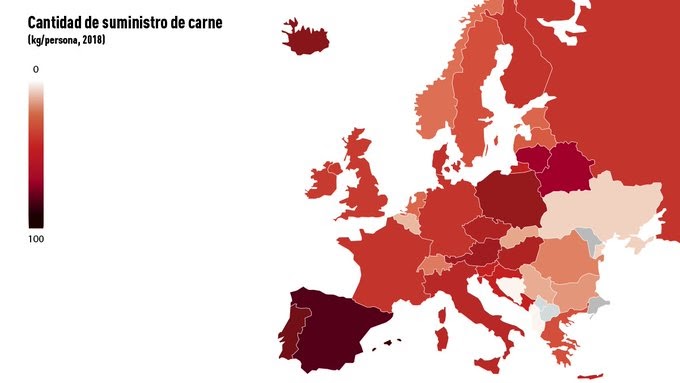
Do we eat too much meat? Relationship between meat consumption and life expectancy.
This last week, in Spain we have relived the eternal controversy about meat: it is bad for your health and it pollutes a lot.
This time it may have had more impact because these statements were made by the Minister of Consumer Affairs Alberto Garzón, who after these statements has been widely criticised in networks, media and even by members of his Government, including Pedro Sánchez (prime minister).
Do we eat too much meat?
These statements occur just in the week in which it has become known that, according to FAO data, we are the country in the European Union with the highest meat consumption.

Following the narrative against meat as a healthy food, we could understand that the Spanish population has more health problems than in the rest of Europe or in countries with less meat consumption. However, we are the country in Europe with the longest life expectancy according to Eurostat. Not only that, Spain is the third country in the world with the highest life expectancy.

We are the European country with the highest meat consumption but we are far from the top of the world ranking led by Hong Kong, which coincidentally is the country in the world with the longest life expectancy.
Obviously, diet is not the only factor affecting life expectancy, but it seems that eating meat does not have a negative effect.
40 Years later the war on fat is over.
In the 1980s, nearly a million Americans died each year from cardiovascular disease. They tried to find a quick fix and found a culprit, fat.
Since then, the USDA (the American Department of Agriculture) launched the famous dietary guidelines "Dietary Guidelines for the United States," in which it is recommended to eat less fatty red meat, eggs and dairy products and increase the consumption of fruits and vegetables. and especially carbohydrates.
Many skeptics called this a huge nutritional experiment and 40 years later you can see the results, it has been a failure.
Looking at almost every parameter, Americans are sicker and more obese than ever:
¨The prevalence of type 2 diabetes increased 166% between 1980 and 2012. Nearly 1 in 10 American adults has this disease, costing the health care system $ 245 billion a year, and an estimated 86 million people are prediabetic. Deaths from heart disease have declined, a fact many experts attribute to better emergency care, less smoking, and widespread use of cholesterol-controlling drugs like statins, but cardiovascular disease remains the leading cause of death in the country. . Even increasing rates of exercise have failed to keep us healthy. More than a third of the country is now obese, making the US one of the most obese countries in an increasingly obese world.¨ - Time Magazine: Ending the War on Fat.
Source: https://time.com/2863227/ending-the-war-on-fat/

New research suggests that it is the excessive consumption of carbohydrates, sugar and sweeteners that are primarily responsible for the epidemics of obesity and type 2 diabetes.
The evidence in favor of fat as an indispensable part of a healthy diet is so overwhelming that it has been inevitable to change the previous narrative.
Will it take another 40 years to end the war on meat?
There is no scientific evidence to determine that meat is harmful to health. They are just potential associations between causes and effects.
There are a huge number of studies that conclude not only that the consumption of meat does not produce any type of harmful effect, but quite the opposite.
Perhaps the most significant is the meta-study published by the Annals of Internal Medicine.This study has been carried out by a panel of 14 experts in which a review and meta-analysis of more than 118 scientific articles (56 cohorts) with more than 6 million participants has been carried out.
The conclusion of the study has been that the possible absolute effects of red meat consumption on mortality and cancer incidence are practically non-existent, and the certainty of the evidence is very low.
We hope that the much promoted drastic reduction of products of animal origin in our diets does not suppose a new experiment in which the health of the general public is as damaged as in the case of fats. We will continue to do our bit to avoid it.



![[LOW CARB RECIPE] Kale Salad With Avocado Dressing](http://cherkyfoods.eu/cdn/shop/articles/cherky_receta_keto_grande.jpg?v=1716364697)

